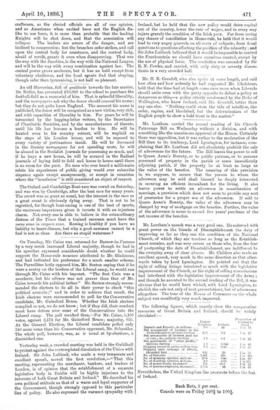Mr. Leatham carried the second reading of his Church Patronage
Bill on Wednesday without a division, and with something like the unanimous approval of the House. Certainly there was opposition, but it was rather to the moderation of the Bill than to its tendency, Lord Lymington, for instance, com- plaining that Mr. Leatham did not absolutely prohibit the sale of advowsons for the future. The Bill leaves the power to sell to Queen Anne's Bounty, or to public patrons, or to persons possessed of property in the parish or some immediately adjoining parish, if the property be at least as large as the value of the benefice. The meaning of this provision is, we suppose, to secure that the person to whom the advowson may be sold shall himself be deeply interested in securing an efficient incumbent for the living. It also leaves power to settle an advowson in consideration of marriage, a provision which does not seem to provide any sort of guarantee for a proper use of the advowson. If sold to Queen Anne's Bounty, the value of the advowson may be charged by way of mortgage on the benefice. Further, the value of the advowson is never to exceed five years' purchase of the net income of the benefice.


































 Previous page
Previous page